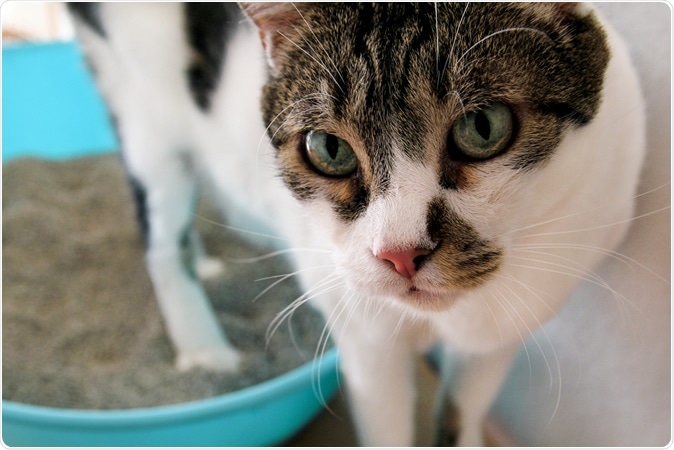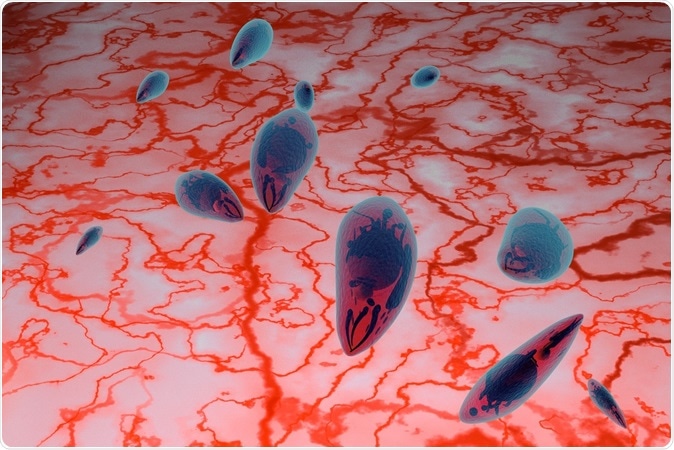Good news for cat lovers! A latest study has found that a parasite infestation found in cat feces could make a person an entrepreneur. Cat feces commonly contain parasite Toxoplasma gondii and its infection can often go unnoticed in most individuals. A new study has found that people who have had T. gondii infection are around 1.4 times more likely to major in business studies compared to those who were not infected.

Cat using toilet, cat in litter box. Image Credit: Zoran Photographer / Shutterstock
People who attended entrepreneurship events and tested positive for T. gondii in addition were 1.8 times more likely to have started a company compared to the uninfected. The study appeared this week in the latest issue of the journal Proceedings of the Royal Society B.

Toxoplasma gondii in venous blood - toxoplasmosis. Image Credit: fotovapl / Shutterstock
T gondii infections commonly occur in humans when they consume contaminated food or water or undercooked meat. Infection or toxoplasmosis can also occur when humans come in contact with cat feces which are known to harbour these parasites. According to the Centre of Disease Control and Prevention (CDC), 60 million people in the United States and 2 billion people worldwide are infected with T. gondii and few of them show symptoms of the infection. Symptoms usually are flu-like with fever, swollen glands and muscle pain etc. Severe toxoplasmosis can damage eyes, vision and the brain. It is particularly dangerous for unborn babies of pregnant mothers.
University of Colorado researchers tested their hypothesis on university students and found that infection with the parasite had an influence on the participants’ entrepreneurial behaviour and risk taking tendencies. Students who tested positive were more likely to have a degree in business studies and those who were professionals were more likely to start their own business. Lead author Stefanie Johnson, who is an associate professor of management at the University of Colorado Boulder's Leeds School of Business explained that there is a positive coorelation between exposure to T. gondii and entrepreneurship behaviour. They also noted that in countries that had a higher prevalence of the parasite had more people who had lower “fear of failure”. Fear of failure is the major cause that discourages an individual from starting a business. Johnson said that their study found the link in terms of number of businesses as well as the participant intentions. What the study did not look at, she said, was the long term successes of these businesses. They noted that the rational fear of failure was found to be reduced to T. gondii infection. Till date this rational thinking has been an explanation for human behaviour, explain the authors. This is the first time that an infection is associated with reduction of this rational fear.
For this study the team recruited 1,495 undergraduate students in biology and business classes. They were tested for T. gondii antibodies and 22 percent tested positive for the infection that they may have had in the past. The team then analyzed the results of the test and compared it with the subject that the student majored in. Those who were majoring in business were then compared the students who were specializing in accounts, finance, management etc.
Results revealed that students who tested positive for T. gondii were 1.4 times more likely to be a business major compared to those who were not infected. Among those majoring in business studies, the T. gondii positive students were 1.7 times more likely to be on the tracks of entrepreneurship and management.
As a next part of the study the team collected saliva samples from 197 people attending entrepreneurship events. Each of these participants was asked if they had started their own business. Those who had tested positive for the parasite were found to be 1.8 times more likely to have started their own businesses.
The researchers then tried to explain this connected worldwide and compared nationally available data from 42 countries with entrepreneurial attitudes and activities among the infected. The positive correlation between the parasite infection and entrepreneurship held on a global level as well proving the researchers correct in their hypothesis. People with toxoplasmosis reported a lower fear of failure that discouraged them from starting out on their own, the team noted.
The researchers next want to see if the businesses started by those infected with the parasite are doomed to fail in future because of the lack of fear of failure and the actual reason behind the connection.